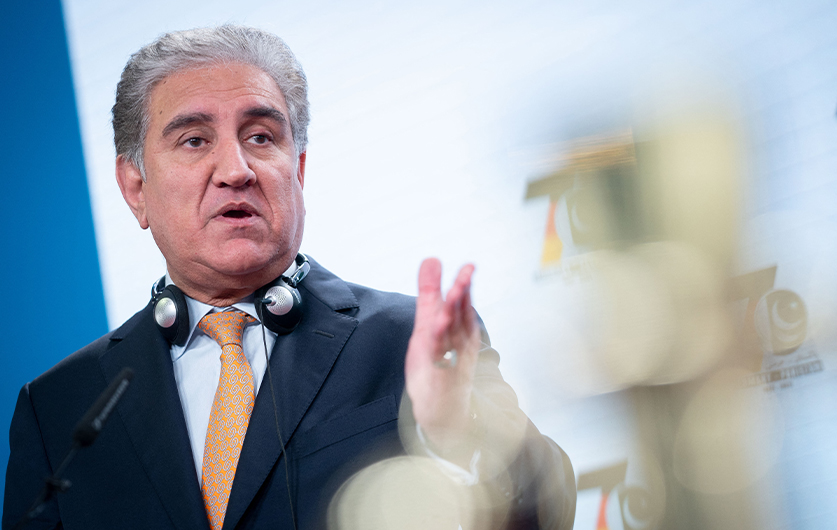ISLAMABAD: Prime Minister Imran Khan said in a video message on Friday that global public opinion was gradually beginning to turn against Israel, hoping that the people of Palestine would soon have their own independent country.
"I can see that the international public opinion on the [Palestinian] issue is changing," he said as the Pakistani nation observed Palestine Solidarity Day. "I have spent a lot of time in the West, but I never witnessed newspapers or politicians in those countries criticize Israel when it perpetrated similar brutalities in the past ... This is the first time the Western media and politicians have condemned Israel."
Khan attributed the change to the rise of social media, saying that it played a vital role in keeping an eye on the mainstream media and allowing people to see what was actually happening in the occupied Palestinian territories.
The prime minister recalled how the leading powers of the world favored South Africa's apartheid regime in the past, though they ultimately changed their stance when the global public opinion transformed against the apartheid regime.
"I am quite certain that the changing international public opinion on Palestine will also force the countries supporting Israel to ultimately accept the rights of the Palestinians," he said. "There will come a day when the people of Palestine will get their own country and a just settlement."
Reflecting on how Israel launched its recent attack on Gaza, Khan said he was visiting the Prophet's Mosque in Madinah on 27th Ramadan when he discovered that Israeli forces had tortured Muslim worshippers in Jerusalem's Al Aqsa Mosque and evicted Palestinian families from their homes.
This, he said, led to the fresh bout of violence in the region, adding that he took up the issue with the secretary general of the Organization of Islamic Cooperation the next day and urged him to raise it in the United Nations.
The prime minister said he discussed the development with Saudi Arabia's King Salman bin Abdulaziz after returning home
"I called Palestinian President Mahmoud Abbas and assured him that we in Pakistan, along with the rest of the Muslim world and those people who believed in justice, firmly stood with him," he continued. "I also instructed [Foreign Minister] Shah Mahmood Qureshi to go to the United Nations General Assembly and raise the issue … I appreciate him for doing it forcefully."
Earlier, Pakistan welcomed the announcement of a ceasefire between Israel and Hamas after 11 days of Israeli aerial bombardment that killed hundreds of Palestinian civilians in the Gaza Strip, with the information minister calling it a “leap forward.”
The Egyptian-mediated truce between Israel and Hamas took hold on Friday at 2:00 a.m. local time, after the worst violence in years.
Since the crisis began on May 10, Palestinian health officials say 232 people have been killed by Israeli airstrikes on the densely populated Palestinian territory that have worsened Gaza’s already dire humanitarian situation, damaged thousands of homes and disabled critical infrastructure. Rocket attacks fired by Hamas — which controls Gaza — killed 12 people in Israel.
“Pakistan welcomes the announcement of a cease-fire. This is the power of collective, unified action; this is the effort of every person and every nation, together for a just cause. May this ceasefire be the 1st step toward peace in Palestine,” Pakistani Foreign Minister Shah Mahmood Qureshi said in a tweet on Friday morning.

Pakistan's Foreign Minister Makhdoom Shah Mahmood Qureshi gives a joint press conference with his German counterpart on April 12, 2021 at the Foreign Office in Berlin. (AFP/File)
Qureshi met António Guterres, UN Secretary-General, on Friday and “heard our deep concern for the people of #Palestine and Pakistan’s unwavering support for their right to self determination.”
“While cease-fire is welcomed, Israel’s occupation of Palestine must end,” he added.
Federal Minister for Information Chaudhry Fawad Hussain on Friday termed the ceasefire a “leap forward” and vowed to continue diplomatic efforts for peace in the Middle East.
“Prime Minister Imran Khan has been leading this diplomatic effort to expose Israeli onslaught against Palestinians,” he said in a briefing with a select group of foreign media reporters in Islamabad.
The information minister said the prime minister was “liaising closely” with other OIC countries to put an end to Israeli atrocities against innocent Palestinians.
“We reaffirm our political, moral and diplomatic support to Palestinians and will continue raising this issue at all international platforms,” the information minister added.
A day earlier, Qureshi — who was on a Palestine peace mission at a United Nations General Assembly emergency meeting called by the Organization of Islamic Cooperation (OIC) and the Arab League — called on the UN to hold Israel accountable for its “war crimes.”
“Israel’s crimes against humanity should not escape accountability,” he said. “There should be no impunity for violation of international law.”
Over 50,000 Palestinians have been rendered homeless by the recent Israeli attacks on the Gaza Strip where they already have limited access to water, food and health services.
The recent attacks were the deadliest outbreak of violence in the region since the seven-week Israeli war on Gaza in 2014, during which 2,300 Palestinians were killed as Israeli forces bombed residential buildings, hospitals and schools.
On Friday, Palestinians who had spent 11 days huddled in fear of Israeli shelling poured into Gaza’s streets, embracing one another in celebration in front of bombed-out buildings on streets covered in wreckage.
Mosque loudspeakers feted “the victory of the resistance achieved over the Occupation (Israel).” Cars driving around East Jerusalem’s Sheikh Jarrah at dawn flew Palestinian flags and honked horns, echoing the scenes in Gaza.
In the countdown to the 2 a.m. (2300 GMT Thursday) cease-fire, Palestinian rocket salvoes continued and Israel carried out at least one air strike.
Each side said it was ready to retaliate for any truce violations by the other. Egypt said it would send two delegations to monitor the cease-fire it had mediated.















